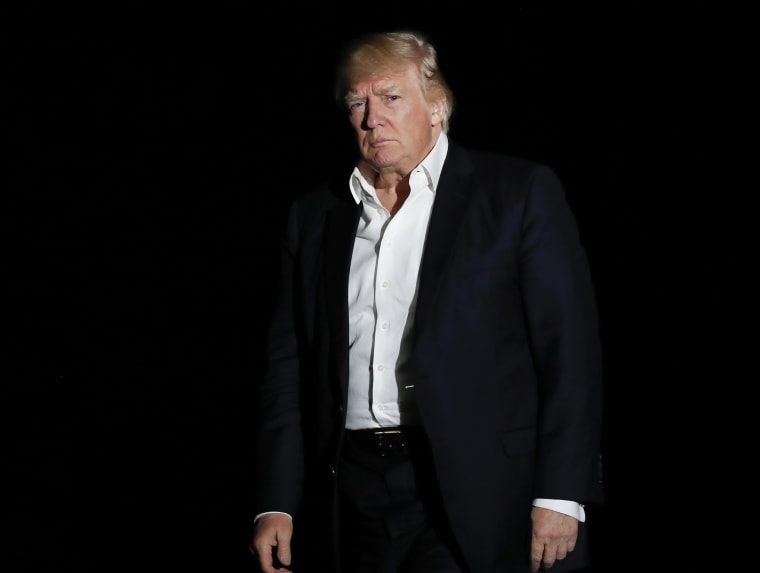First Read is your briefing from Meet the Press and the NBC Political Unit on the day's most important political stories and why they matter
Trump loses some sway with fellow Republicans
In the aftermath of President Trump’s firing of FBI Director James Comey, two things have happened when it comes to Trump’s standing with his own party. One, congressional Republicans haven’t abandoned Trump on Comey (yes, some have criticized the timing, but there isn’t a growing GOP demand for a special counsel). Two, enough of them are beginning to buck their president on non-Comey items. That includes Sens. John McCain (R-AZ) and Ben Sasse (R-NE) saying they’re opposed to Trump’s pick to be U.S. trade representative, and three Republicans who worked to defeat a GOP-backed resolution to repeal an Obama environmental regulation.
So while Republicans aren’t in open revolt when it comes to Comey directly, we’ve seen some signs in the last 24 hours how Trump’s legislative agenda, as well as his staffing priorities, could be in peril. And as for Democrats, it’s hard to imagine how the president has the juice to win over any members of the opposition. Don’t forget: At this same point in time of George W. Bush’s presidency, there were a handful of Democrats who supported his tax cuts, and Ted Kennedy was working with his administration on education.
NBC’s Lester Holt interviews Trump
NBC’s Lester Holt today interviews President Trump, and it will air on “Nightly News.” What will President Trump say about his recent firing of FBI Director James Comey? Be sure to watch!
Some of the new details we’ve learned about Trump vs. Comey
- The Washington Post: “Trump was angry that Comey would not support his baseless claim that President Barack Obama had his campaign offices wiretapped. Trump was frustrated when Comey revealed in Senate testimony the breadth of the counterintelligence investigation into Russia’s effort to sway the 2016 U.S. presidential election. And he fumed that Comey was giving too much attention to the Russia probe and not enough to investigating leaks to journalists.”
- The New York Times: “After President Trump accused his predecessor in March of wiretapping him, James B. Comey, the F.B.I. director, was flabbergasted. The president, Mr. Comey told associates, was ‘outside the realm of normal, even ‘crazy.’”
- A former senior intelligence official, per NBC’s Ken Dilanian: “The way this was done, I think was done to send a message to the FBI agents left behind. It’s not just that they removed him – it’s that they did it in the most thuggish and humiliating way possible. No notice, no nothing – instant execution.”
- “[Deputy Attorney General Rod] Rosenstein threatened to resign after the narrative emerging from the White House on Tuesday evening cast him as a prime mover of the decision to fire Comey and that the president acted only on his recommendation,” the Washington Post also reports.
- NBC’s Stephanie Ruhle: “The majority of White House staff – including some of the most senior members of the Trump team – found out the Comey news moments before or watching it on TV [Tuesday]. There was no internal meeting, no strategy session,” per a senior White House official.
A timeline of developments in the Trump-Russia storyline
Feb. 13: National Security Adviser Michael Flynn resigns just after the Washington Post first reported that the Justice Department had informed the White House that Flynn could be subject to blackmail
Feb. 14: The New York Times reports that Trump's 2016 campaign "had repeated contacts with senior Russian intelligence officials"
March 1: Washington Post reports that Attorney General Jeff Sessions met with Russia's envoy twice last year — which he didn't disclose in his confirmation hearing
March 2: Sessions recuses himself from any federal inquiries involving Trump's 2016 campaign
March 20: FBI Director Comey confirms his agency is investigation allegations that Trump's 2016 campaign might have contacts with Russian entities. Comey also says there's "no information that supports" Trump's wiretapping charges against Obama
March 22: House Intelligence Chair Devin Nunes goes to the White House and tells reporters that he has seen evidence of potential surveillance activity on Trump campaign officials
April 6: Nunes steps down from House Intelligence Committee’s Russia probe, and the move comes as the House Ethics Committee announces that it is investigating allegations that Nunes mishandled classified information
May 2: Trump tweets that Comey “was the best thing that ever happened” to Hillary Clinton, and adds that the Russia investigation is “phony”
May 3: Comey tells a Senate Committee that he won’t be providing updates about the FBI’s Russia inquiry until the matter is concluded
May 8: Former Acting Attorney General Sally Yates testifies on Capitol Hill that she warned Flynn could be subject to blackmail for apparently lying about his contacts with the Russian government (Flynn remained in office for 18 more days)
May 8: Trump tweets, “The Russia-Trump collusion story is a total hoax, when will this taxpayer funded charade end?”
May 9: Trump announces that he fired FBI Director Comey



